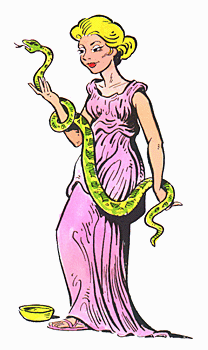Hygeia became Hygiene, a source of health
(Greek Goddess [Hygeia, Hygea, Hygia, Hygieia], the source of the word hygiene)
Hygeia (also Hygea, Hygia, Hygieia) was the Greek goddess of health and she was worshiped in connection with Aesculapius. She was said to be one of his daughters [some writers say she was his wife]. Originally, she was the guardian of physical health and later became the goddess of mental health, as well. Eventually, she became a protectress against various kinds of danger, an attribute which she shared with Asculapius.
2. Cleanliness that promotes health and well being; especially, of a personal nature.
3. That department of knowledge or practice which relates to the maintenance of health; a system of principles or rules for preserving or promoting health; sanitary science.
2. A reference to health or its preservation.
3. Clean or free from disease-causing microorganisms.
4. Belonging or relating to hygiene; sanitary.
2. Someone who specializes in hygiene, or in a specific branch of hygiene, such as, a dental hygienist.

She was often symbolized with a snake drinking from a "cup" in her hand and, as with her father, the snake was often related to healing.
It is from Hygeia that we get our words hygiene, hygienic, hygienically, hygienics, hygienist, hygiology, hygeology, unhygienically, and unhygientic. Several scientific activities categorized under the name of hygiene have been far more significant to our well-being than any contributions we now have from her father [or husband, whatever the truth may be].
Hygiene is the science of preserving health. The subject of hygiene includes all of the agencies affecting the physical and mental well-being of people. In its personal aspects, it involves consideration of food; clothing; water and other forms of drink; work; sleep; and exercise; personal cleanliness; special habits, such as the use of narcotics, tobacco, alcohol, etc.; and other kinds of mental health.
In its public aspects, it is concerned with soil; climate; character; materials and arrangement of dwellings; heating and ventilation; removal of wastes; medical knowledge on the incidence and prevention of disease; and the disposal of the dead.
All of the various kinds of health fall under the name of "hygiene", but we have no words that have come into our language which are even remotely related to Aesculapius.
Related "health" word families and articles: Health: Index; hygieio-, hygiei-; iatro-, -iatrician; salu-; sana-, sani-.
